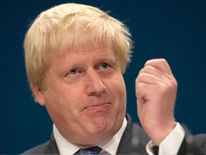"Worse than a slaughterhouse" were the words the outgoing UN Chief, Ban Ki Moon, used to describe the killing in eastern Aleppo.
And it is easy to see why he used such a graphic analogy.
The pictures streaming out of the city have been horrific.
Little boys bloodied and caked in dust; their eyes dead with trauma. Babies dug out from the rubble. Their limp bodies held aloft accusingly by rescue workers.
But, none of these appalling attacks on civilians have changed the calculations in the West . Intervention, it seems for the moment at least, is not the answer.
History tells us there are generally four guiding principles by which leaders are moved to act.
1. Public pressure means they have the democratic mandate needed to do something.
This something usually involves deploying military force. But, although people in the West are appalled by what is happening, there is not a groundswell of support for sending troops or military assets into Syria.
2. The leader(s) own political convictions.
In the current zeitgeist, against the backdrop of Afghanistan, Iraq and to a lesser degree Libya, intervention has lost much of its allure.
And this leads onto point number three.
3. Will an intervention make a difference and will it ease the suffering of Syrian civilians?
This is debatable. But broadly the argument can be summed up as 'more bombs to stop the bombs against more bombs are just going to make things worse'. We could describe this as oil on the fire vs water on the fire.
4. It is in the country's strategic interest to act?
It might be a case of protecting an ally, or military foothold in a region, or even denying that advantage to another power. Syria does not fall into this category as it has been in Russia's sphere of influence since the Cold War.
It is easy, when faced with such violence, to see today's leaders as pusillanimous. But it is hard to think that western statesmen of the past, when taking into consideration the above, would have acted much differently.
The complexity of the battlefield in Syria and the presence of Russia in the fight make intervention a risky option.
The obvious danger is that the conflict turns into a big power confrontation, which clearly carries the possibility of escalation well beyond Syria's borders.
It is also hard to identify what the West's objectives are in Syria. As a consequence of that, US and European policy is confused at best.
Is the objective simply to stop the killing and save lives?
That seems to be one of the aims but, evidentially, it is not the core objective. If it were, the West would work with Russia (and by default Assad) and target the extremist groups, some of whom now make up the opposition.
They would be targeted not because they are doing the most killing (they are not - Assad is) but because it would be the quickest way to bring a close to the fighting.
President Assad would then be able to exert control over the country again and the bombing would stop.
In this scenario, stability would return.
So too would torture and the police state, but neither of those things seemed to give the West sleepless nights prior to the so called 'Arab Spring'.
From a purely utilitarian perspective (that which saves the most lives) this may well be the best course of action. But there is also much that is morally unpalatable about it. This is one of the reasons, as the latest ceasefire showed, it was doomed to fail.


